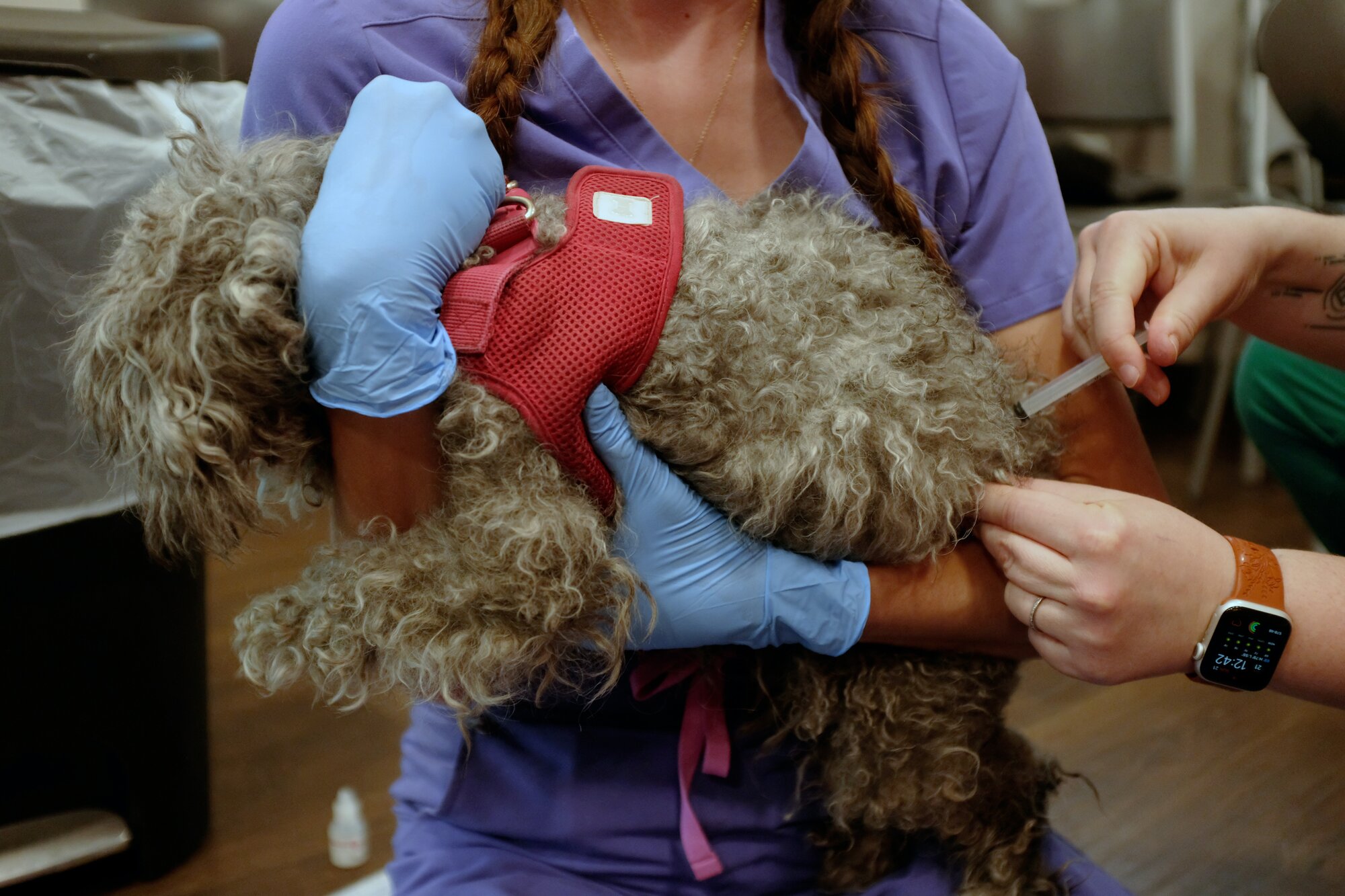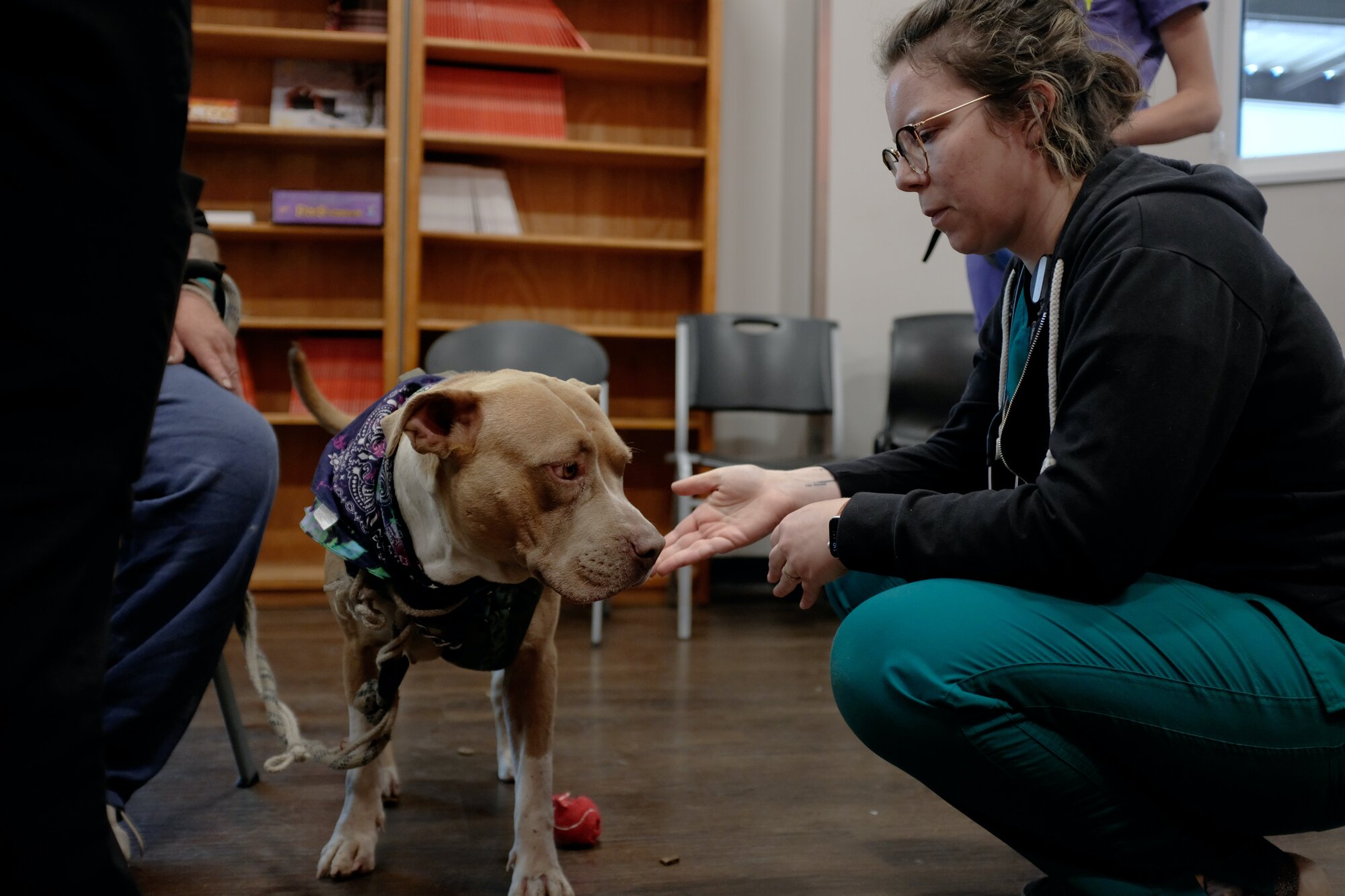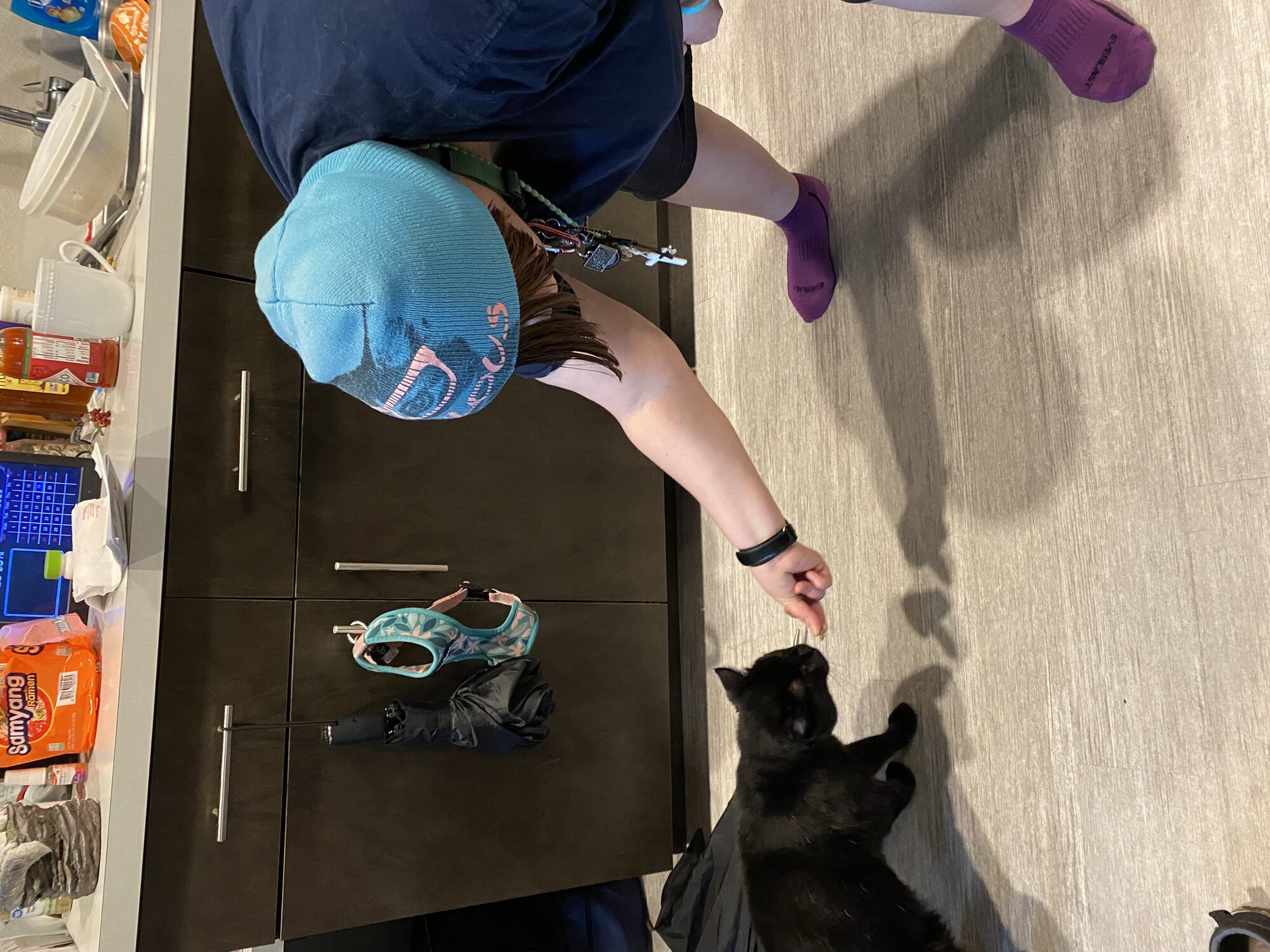Unhoused residents of Colorado Springs say pets keep them grounded

COLORADO SPRINGS — Marc Trujillo didn’t want a dog.
Living out of his car, bouncing towns when life felt unlivable and sleeping outside through Colorado winters hardly felt like an environment conducive to keeping a pet.
In 2021, Trujillo stopped in Montrose on a road trip from Utah back to Colorado Springs. He pulled into a Walmart parking lot, picked a piece of cardboard out of a nearby dumpster and scribbled “please help,” onto the cardboard sign. On his palm, he wrote, “spare change.”
Another woman who he presumed to be homeless and asking for money approached him with a sign. He thought little of it, then realized the sign read “free puppy.” Though Trujillo was skeptical of the Pitbull-Great Pyrenees mix because having a dog under his circumstances seemed daunting the two bonded immediately, making it impossible for Trujillo to say no to the woman giving him away.
Two years later, Trujillo said he can’t imagine life without Milo, who he sees as his guard dog, best friend and child. Milo is hardly the aggressive Pitbull the breed has earned a reputation for. He lies at Trujillo’s feet, mostly with his eyes shut. He militantly listens to Trujillo’s commands and hardly interacts with others unless they approach first.
“I don’t look at him as a pet,” Trujillo said. “He’s my child, pretty much. He watches over me like I do him.”
Related Stories
Trujillo camps on the west side of Colorado Springs. While he shares compassion for other people experiencing homelessness, he also finds many of his peers have severe, untreated mental disabilities. He’s had several dangerous encounters with others on the street and said Milo protects him, as Milo can sense the danger often before he can.
“He's a better judge of people than I am. He lets me know if they get into my bag,” Trujillo said. “That’s what keeps us away from certain people. He just knows.”
Trujillo is Indigenous and doesn’t see his living outside as “homeless.” Instead, Trujillo wishes he could legally live outdoors in a place where he feels is deeply connected to his ancestors. In his perfect world, Trujillo would sleep under the stars as much as possible with warming centers when weather becomes dangerously cold.
“We’re not homeless, because this is where I feel most comfortable,” Trujillo said. “I’m just tired of the people who are against us all the time.”
Springs Rescue Mission — Colorado Springs’ largest homeless shelter — allows its residents to maintain overnight care for their pets, so long as the pet is kept in a kennel while they’re inside their shelter bed. During the day, they’re free to take the pet wherever they please. But Trujillo said the shelter requires pets to be microchipped and registered. He believes that process is unnecessary and potentially dangerous for Milo, so he chooses to keep the two outside. Keeping Milo at his bedside would be out-of-question in a shelter.
“I just know the powers that be and my creator will take care of us,” Trujillo said about he and Milo, regardless of where they’re living. “I have a spirit that’s willing to help anybody as long as they’re not evil and mean.”
Pets come first
Daniel Kellog has navigated living in his car the last six months. His dog, Rockstar, always eats first, sleeps closer to the heater and takes priority as the two navigate survival.
“He thinks it’s great,” Kellog said. “He thinks we’re on extended vacation while we live out here.”
Rockstar, a corgi, is more like a child than a pet for Kellog. If Kellog can afford a nice dinner, the dinner feeds both of them. Whenever he gets the chance, Kellog lets Rockstar chase bugs and squirrels in the park. And when life gets tough, Kellog turns to Rockstar, who he knows understands him and knows when he needs cuddles or a toothy grin.
“Giving him up would never even be an option,” Kellog said. “He’s my son. He’s my family.”
Sarah O’Day is a veterinarian who works full-time at Fort Carson and volunteers for The Street Dog Coalition, a group of veterinarians who provide medical care to pets of those experiencing or at-risk of homelessness. She said putting pets first is common for those living on the streets, who often have nothing.O’Day said the owners she works with almost always choose pet food before human food in the face of limited resources.
“These pets are everything,” O’Day said. “It just shows how much these folks really care.”
The Street Dog Coalition is based out of Fort Collins and has volunteers around Colorado. Its Colorado Springs team meets pets within their mobile clinic at Springs Rescue Mission and provides vaccines, testing and other medical care to animals.

Small dogs like Bear don't have easy access to veterinary care, but veterinary technicians with with Street Dog Coalition performed a check-up on him and shaved off intensely matted fur during a free clinic at Springs Rescue Mission. (Zach Ben-Atmos/Rocky Mountain PBS)
Despite living on the streets being incredibly taxing emotionally, mentally and physically, O’Day said most pets she meets are well-taken care of, with owners who would do anything for their companion.
“For a lot of these individuals, their pet is kind of their lifeline,” O’Day said. “One of the mottos of The Street Dog Coalition is not only caring for the dog at one end of the leash — but also for the human at the other end of the leash.”
Josh and Gina Koch — a mother and son experiencing homelessness for years — said their dog, Bolt, serves as a guard as the two navigate sleeping outside and in the back of a truck. Though Gina said she doesn’t agree with the “pet needs over owner needs” mentality of many unhoused people, Bolt feels like a second son to her.
“He’s very protective,” Gina said.
Bolt was found “strapped up in an apartment and starving to death,” Gina described. Since taking him home, two have tried their best to help Bolt gain weight by feeding him human food but say his weight doesn’t budge. Still, Bolt is a crucial part of their lives, and they do their best to take care of him.
“The look on his face — he knew that we saved him,” Gina said. “We went in there and untied him, and the look on his face said, ‘Thank you.’”
Wayne Stalay, who has experienced homelessness for about two months, said his dog — a chihuahua named “Lady” — is treated with more compassion than he is by police, community members in housing and other people experiencing homelessness.

Dr. Taylor DeWitt volunteers with Street Dog Coalition to provide free veterinary care for dogs at the Springs Rescue Mission. (Zach Ben-Atmos/Rocky Mountain PBS)
“People care more about the animals than the humans,” Staley said. “Because when we’re out here, we’re less than an animal.”
Lady has a black, furry beard matching Stalay’s grey beard. He said the shared beards make the two feel connected on a deeper level, more like family than a pet and its owner.
“If anyone touched her, I’d kill them,” Stalay said. “And I’m serious about that.”
Woman’s best friend

Sabrina Reed felt her life had hit its lowest low when she ended up houseless in Colorado Springs, a town she knew nothing about, across the country from her home in Pennsylvania.
Reed drove cross-country for her then-girlfriend, who was living in Colorado Springs. The two broke up in 2017 — shortly after Reed’s arrival — and Reed lost all members of her previous support system. She then moved herself and all of her belongings into her car. Parking lots where she knew police would leave her alone became home.
Her car was eventually towed and she lacked money to get it back, forcing her into The Salvation Army RJ Montgomery Center, a homeless shelter in Colorado Springs.
“I’m suicidal and it does get rougher when you’re out here, especially when you’re by yourself,” Reed said. “The biggest part of why I’m still here today is for my cat, Midna."
Midna came to Reed by way of a friend she was camping with while the two were both without housing. The friend returned to their shared car one day with news that he planned to buy a cat, leaving Reed shocked.
“I looked at him baffled,” Reed said. “We’re homeless, we don’t have any money, we don’t even have an address.”
When the two got Midna, Reed said she looked deeply neglected and in need of loving owners, convincing Reed that the two had no choice but to take her in, even if circumstances were less than ideal.
As Reed and Midna grew closer, Midna became Reed’s best friend.
“She’s the most special thing in my life,” Reed said. “She keeps me grounded.”
Midna now rests inside the top carton on a stack of cardboard boxes against the wall in Reed’s apartment at Greenway Flats — a permanent supportive housing apartment complex run by Springs Rescue Mission. Midna is shy when meeting a new visitor, but Reed usually manages to coax her out with a treat or a toy.
Reed’s support system vanished when she fell into homelessness, so she trained Midna to be her primary source of emotional support. Midna answers to having her name called, performs tricks and looks out for Reed in the exact ways Reed said she needs.
"A lot of this has been really traumatizing for me,” Reed said. “It does take time to heal over a lot of therapy and a lot of good vibes and training Midna to the best of my ability, but she makes things go better.”
Alison Berg is a journalist at Rocky Mountain PBS. You can reach her at alisonberg@rmpbs.org.
Zach Ben-Amots is an investigative multimedia journalist at Rocky Mountain PBS. You can reach him at zachben-amots@rmpbs.org.